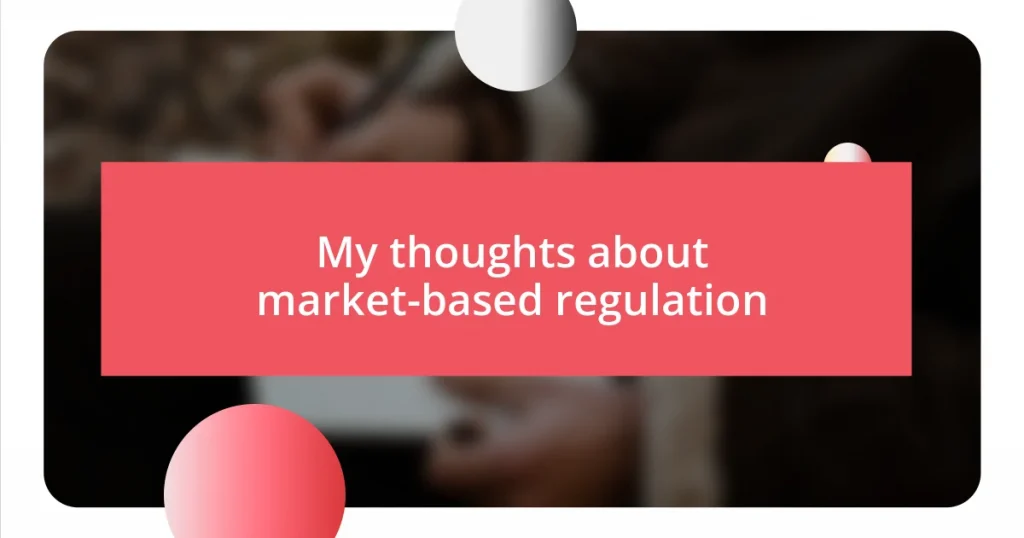Key takeaways:
- Carbon leakage occurs when businesses relocate to countries with less strict environmental regulations, increasing global greenhouse gas emissions.
- The phenomenon affects local economies significantly, leading to job losses and economic destabilization for communities relying on those businesses.
- Effective strategies to combat carbon leakage include implementing carbon pricing, offering incentives for sustainable practices, and fostering international cooperation on environmental standards.
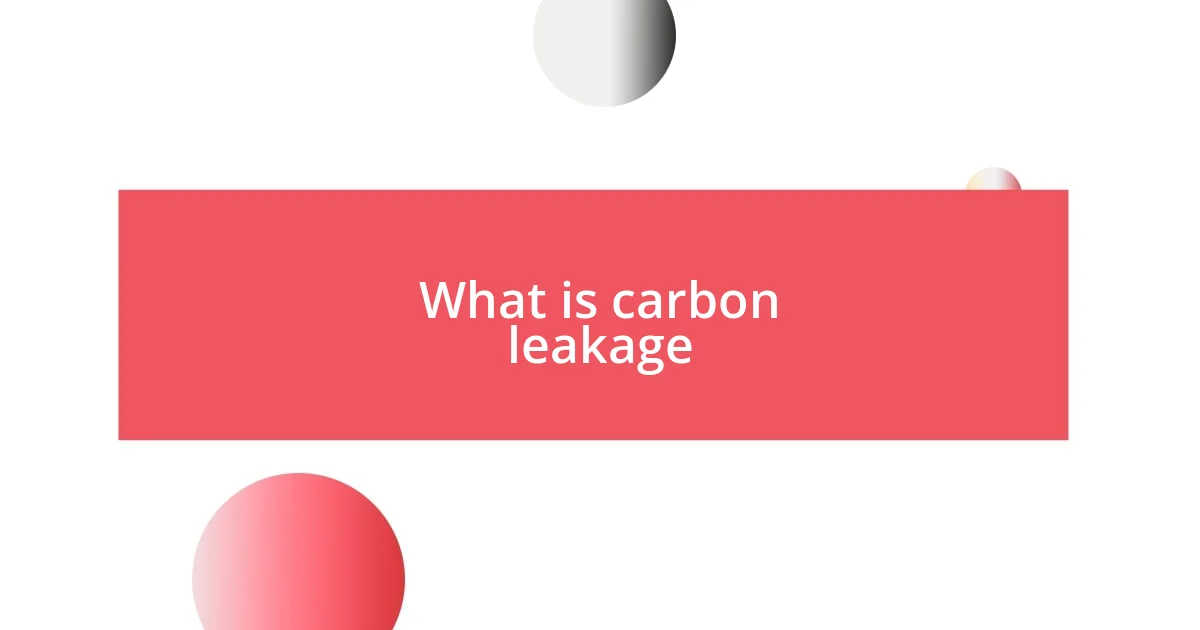
What is carbon leakage
Carbon leakage refers to the phenomenon where businesses move their operations to countries with less stringent environmental regulations, resulting in increased greenhouse gas emissions globally rather than a decrease. I often wonder how this impacts our efforts to combat climate change. When I think about companies prioritizing profit over environmental standards, it’s disheartening to realize that our collective progress can be undermined by these decisions.
I remember attending a conference where experts discussed this issue, and one speaker shared a story about a factory relocating from a country with strict emission controls to one with lax regulations. The emotional weight of that story hit me; it painted a vivid picture of a compromise we can’t afford. When emissions are simply shifted rather than reduced, can we genuinely call it progress?
Moreover, the consequences of carbon leakage extend beyond just environmental concerns; they often affect local economies and job markets as well. It’s a complex issue that raises the question: how can we create a fair market that encourages companies to adopt sustainable practices without risking their financial viability? Reflecting on this has pushed me to advocate for stricter international regulations that can help mitigate carbon leakage effectively.
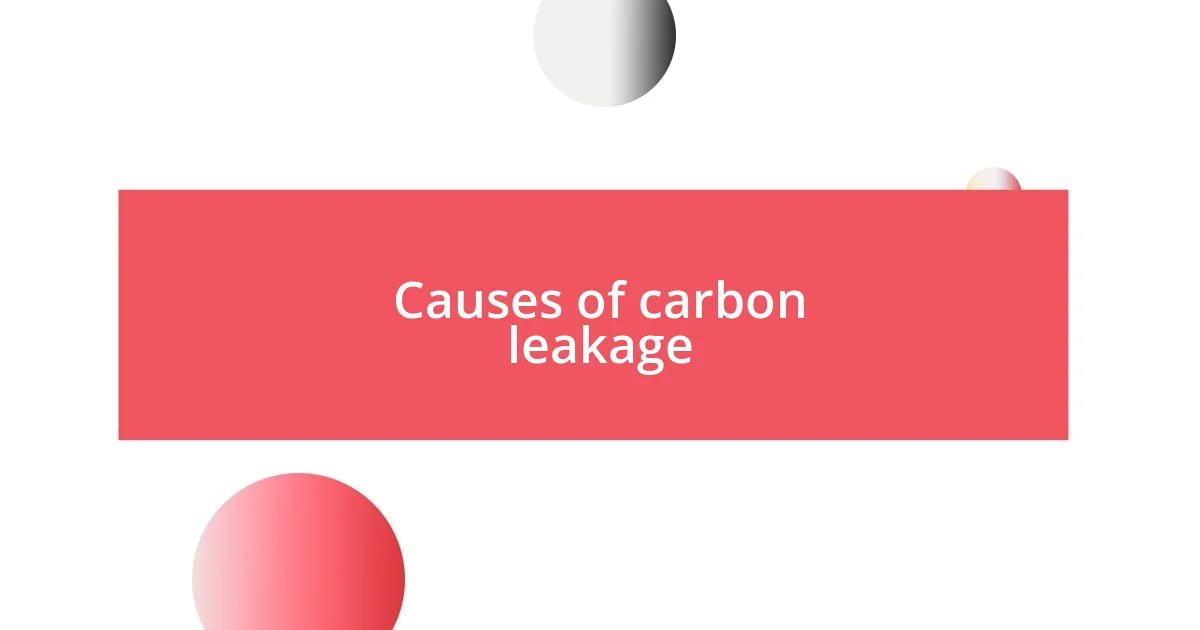
Causes of carbon leakage
One of the primary causes of carbon leakage is the varying environmental regulations between countries. When companies can shift operations to regions with looser standards, the temptation to maximize profit often overrides the commitment to sustainability. I recall a conversation with a business owner who expressed relief when moving to a country with less regulation. It stuck with me, as he seemed unaware of the bigger picture – the global repercussions of his business decision.
Economic competitiveness plays a significant role in driving carbon leakage. Countries with stringent regulations can inadvertently push businesses to relocate to places with cheaper, less regulated environments. This is concerning because I’ve seen industries thrive ethically in high-regulation areas. Their success shows that strong environmental policies can coexist with profitable businesses. Yet, the allure of lessened oversight can sway even the most well-meaning enterprises.
Moreover, the pressure to remain competitive globally can lead companies to prioritize short-term gains over their long-term environmental responsibilities. It’s a balancing act that often tips into the wrong direction. I remember a colleague who worked tirelessly to implement green practices in her company, only for them to fold under pressure when competitors moved to greener pastures. This scenario is all too common and highlights the complex dynamics of today’s global economy.
| Cause | Description |
|---|---|
| Varying Regulations | Differences in environmental laws encourage companies to relocate operations to countries with less stringent controls. |
| Economic Competitiveness | Stricter regulations can drive businesses to seek more cost-effective options abroad, often at the expense of environmental practices. |
| Short-Term Gains | Pressure to remain competitive may lead companies to prioritize profit over sustainability in decision-making. |
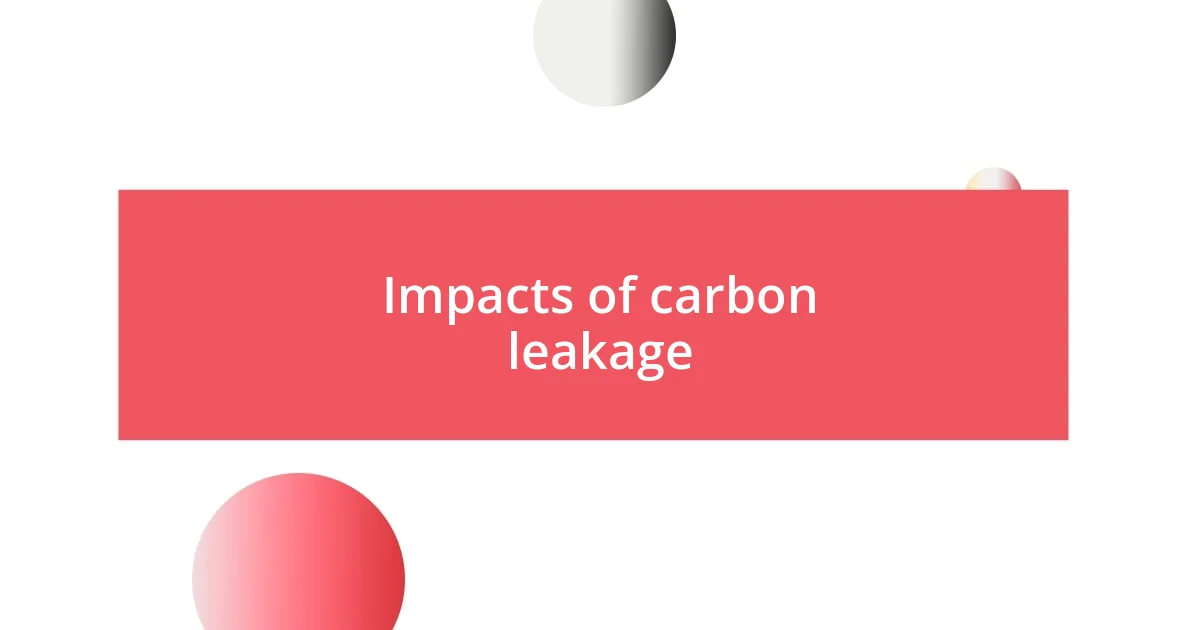
Impacts of carbon leakage
The impacts of carbon leakage ripple through our environment and society in ways that can feel both immediate and far-reaching. I still find it disheartening when I hear stories of communities suffering because a major employer decides to relocate. The local economy often takes a hit, leading to job losses and a decline in local investments, which can create a cycle of poverty that’s difficult to break. It’s a stark reminder that our choices have consequences beyond pure economic calculations.
- Increased greenhouse gas emissions contribute to global warming, undermining climate change efforts.
- Communities face economic destabilization as jobs are outsourced, creating social inequities.
- The pressure on local industries to compete may lead to a race to the bottom regarding environmental standards, further exacerbating ecological damage.
It frustrates me to think about how every time a factory moves to dodge regulations, it not only displaces workers but also tarnishes the reputation of responsible businesses that truly strive for sustainability. I once spoke with a local NGO leader who passionately shared about a small town nearly wiped out after a factory closure. That conversation left me pondering the long-term repercussions for not just the environment, but for entire communities – a conversation that often feels overshadowed by profit margins and bottom lines.
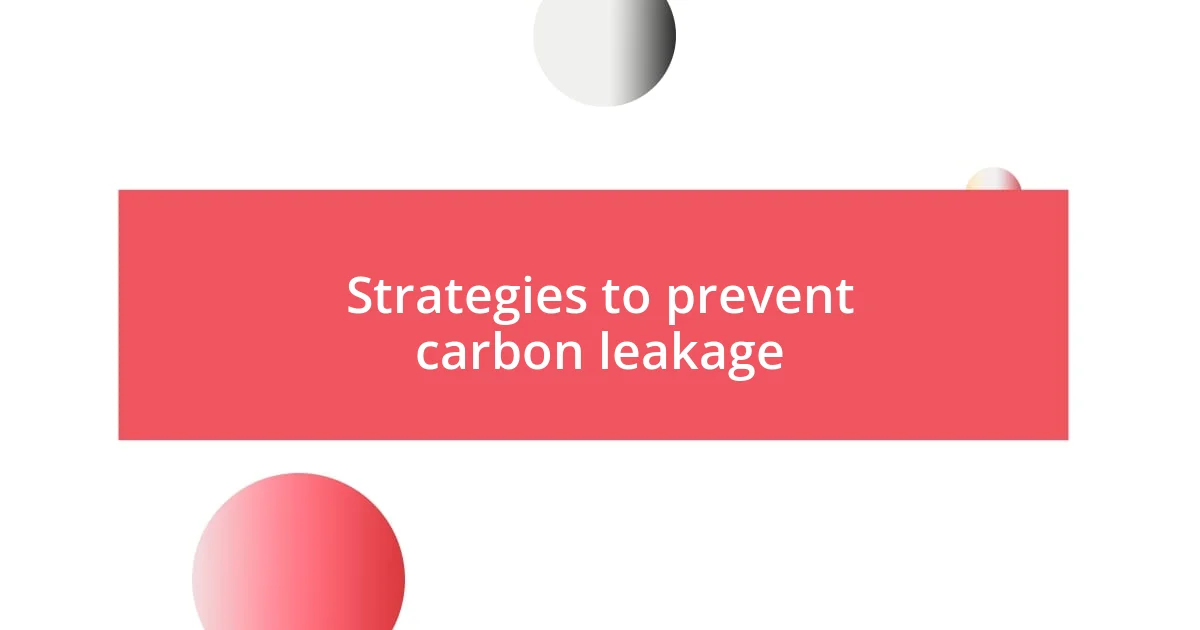
Strategies to prevent carbon leakage
To combat carbon leakage, governments can implement carbon pricing mechanisms. This approach not only levels the playing field for businesses operating under stricter regulations but also incentivizes companies to innovate towards greener practices. I once discussed this concept with a sustainability consultant who pointed out how a well-structured carbon tax can effectively motivate businesses to reduce emissions rather than relocate.
Another effective strategy involves creating incentives for companies to adopt sustainable technologies. These incentives might take the form of tax breaks or grants for organizations that invest in cleaner processes. Thinking back to an initiative I witnessed in a local industry, this tactic truly bore fruit; companies that embraced renewable energy sources saw not just environmental benefits but also a boost in their public image and consumer loyalty.
Furthermore, fostering international cooperation on environmental standards can mitigate the risk of carbon leakage. By aligning regulations across borders, we can reduce the temptation for companies to leap to regions with lenient policies. Reflecting on a conference I attended, the discussions around cooperative agreements were invigorating. It made me realize that when nations work together, they can create a robust framework that supports sustainable business practices while still fostering economic growth. Isn’t it encouraging to think about a future where collaboration leads the way in tackling climate challenges?
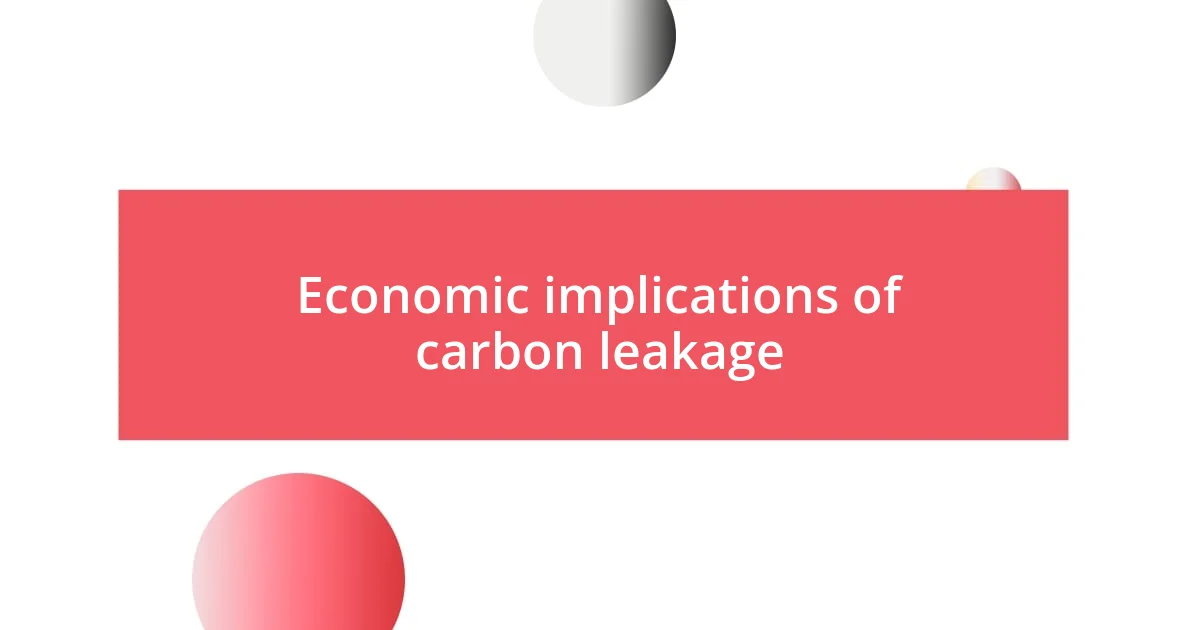
Economic implications of carbon leakage
The economic implications of carbon leakage extend beyond immediate job losses; they can destabilize entire regions. I remember attending a local town hall meeting where residents voiced their frustrations after a nearby manufacturing plant relocated to save on compliance costs. The heartfelt speeches I heard highlighted not just lost wages but a collapsing sense of community. It struck me then how deeply intertwined our local economies are with responsible corporate behavior.
Moreover, there’s this unsettling trickle-down effect on small businesses. When larger corporations cut costs and relocate, local suppliers and service providers often face reduced demand, leading to a cascading series of layoffs. I once spoke with a coffee shop owner who shared her struggle to remain afloat after the factory’s closure meant fewer workers and less foot traffic. It made me wonder: how long before we start seeing ghost towns where vibrant economies once flourished?
Then, of course, there’s the race to the bottom regarding environmental standards. I’ve seen firsthand how some regions lower their regulations to attract businesses, creating an unbalanced playing field that prioritizes profit over sustainability. Do we truly want to live in a world where the quality of life is sacrificed for a few extra dollars? It’s a sobering thought. Each decision made in the name of economic expedience must be weighed against the long-term ecological and social costs that can leave us all in a precarious position.















